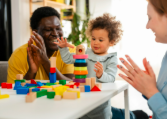Early childhood is a critical time for emotional growth, social development, and building positive habits that last a lifetime. Nurturing mental wellness in young children helps them feel safe, loved, and capable of facing new experiences. When caregivers and educators create a supportive environment, children are better prepared to develop resilience and form healthy relationships.
Creating a Positive Emotional Environment
Young children thrive in settings where they feel secure and valued. This starts with consistent routines, warm interactions, and encouragement. Greeting children with a smile, acknowledging their feelings, and giving them space to express themselves openly can make a significant difference in their emotional well-being.
Simple activities like daily check-ins, using emotion charts, or storytelling with characters experiencing different feelings help children build awareness and vocabulary around their own emotions.
Encouraging Self-Regulation
One key aspect of mental wellness in early childhood is learning how to manage big feelings. Teaching self-regulation doesn’t happen overnight—it takes patience and modeling. Games that involve taking turns, breathing exercises, and calm-down corners provide young learners with tools to navigate emotional ups and downs.
For example, introducing a “quiet jar” or practicing deep belly breathing together can guide children through moments of frustration or sadness in a healthy, constructive way.
The Power of Play
Play is not just fun—it’s foundational to healthy development. Through play, children explore their world, practice social skills, and process emotions. Pretend play, drawing, and building help children express feelings they may not yet have the words for.
Creating a classroom or home space with a variety of open-ended materials invites imaginative play, allowing young minds to work through experiences and build confidence.
Supporting Relationships
Strong, trusting relationships with adults and peers provide a secure base for children to explore and grow. Adults can foster these bonds by listening attentively, offering comfort, and spending quality one-on-one time with each child.
Children also benefit from guidance on how to cooperate, resolve simple conflicts, and show kindness. These social skills strengthen their sense of belonging and emotional safety.
Involving Families
When families and educators work together, children receive consistent support. Sharing updates, encouraging open communication, and celebrating small wins can empower families to continue fostering emotional health at home.
Workshops, take-home activities, or family-friendly newsletters can help parents and guardians feel informed and included in their child’s social-emotional journey.
Final Thoughts
Nurturing emotional well-being in early childhood lays the foundation for a lifelong sense of confidence, empathy, and joy. With simple, everyday actions—like offering a listening ear, encouraging creative play, and guiding emotional expression—caregivers and teachers play a powerful role in helping young children flourish.


